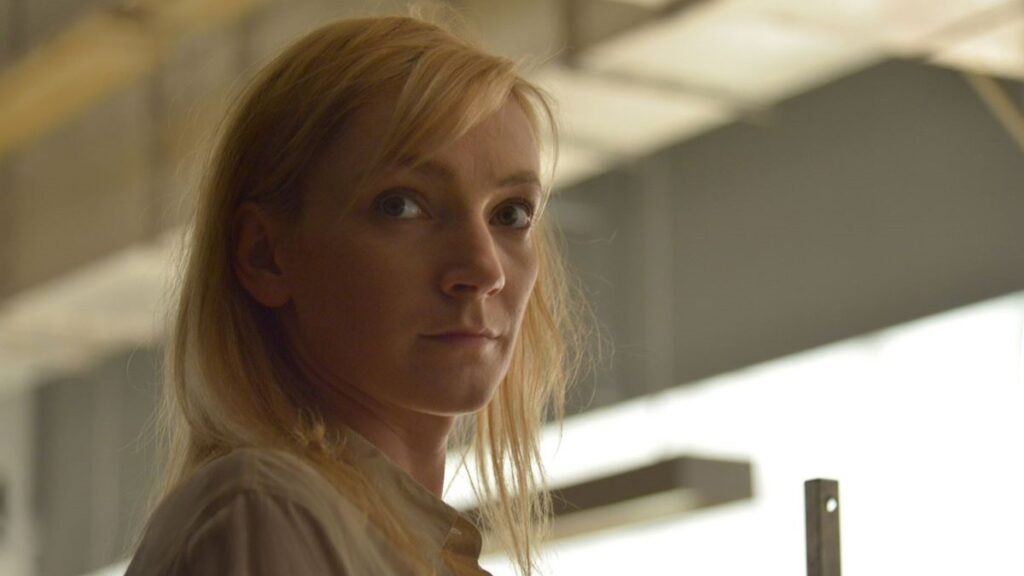In dreams, two deer – a stag and a doe – forage for grass in a snow-covered forest and drink from a stream. In reality, two slaughterhouse workers, both disabled, both isolated in their own way, forge an unlikely, unexpected connection amid the mundanity, brutality and knotty social politics of their workplace. Mária (Alexandra Borbély) is the new quality inspector, shy and withdrawn, likely autistic; Endre (Géza Morczányi) is the slaughterhouse manager, congenial but detached, and immediately intrigued by his new employee, whose reservedness contrasts vividly with the brashness of his friends and colleagues. Literally, they dream the same dream – the stag and the doe, silently sharing their foraged finds, tentatively drawing closer to one another, the promise of warmth and belonging in a wintry landscape, and this strange oneiric connection will draw this pair closer in reality too.
Equally unexpected was the return of Ildikó Enyedi to the front line of the European arthouse scene in 2017. A string of moderately well-received features through the ‘80s and 90s had long since petered out and, frankly, too few were clamouring for her re-emergence. For all the variety of contemporary international cinema, one need only cast a glance over the best-reviewed titles of modern times to see that a certain style of cinema dominates – graphic, lean, masculine cinema, several decades’ worth of critical theory engendering less a proliferation of critical perspectives than a narrow synthesis. Emotion, delicateness and femininity are passé; the closer a filmmaker can come to successfully aping Hitchcock, Ford or Kubrick, the better their chances of wooing the critical masses.
But Enyedi returned nonetheless, nine years after her last film work, and 18 years after her last feature. A hit TV show on HBO Europe had brought her back into the limelight, but her biggest hit was yet to come. On Body and Soul was entered into the 2017 Berlin International Film Festival, where it won the Golden Bear, the FIPRESCI Prize, and the Prize of the Ecumenical Jury, and a filmmaker forgotten by so many was now the toast of the film world. In winning the Golden Bear, Enyedi beat festival favourites like Hong Sang Soo, Aki Kaurismäki and Sebastián Lelio, all directors whose careers had gone from strength to strength as hers had dwindled over the past two decades. She wasn’t just back on cinema’s front line, she was assuming a position of prominence there that she’d never experienced before.
For its emotional sensitivity, its delicate style, and its gentle femininity, it’s quite the achievement for On Body and Soul to receive such acclaim. This is a distinctly soft and quiet film, calm and measured even as it chronicles potentially explosive material – a police investigation, sexual harassment, and moments of startling violence, where streaks of red course through a colour palette of icy, pallid whites and beiges.
Scored only with intermittent interludes of glassy, twinkly motifs, it’s an ostensibly pedestrian affair, slow and patient, but that patience and the apparent stylistic sparseness allow for emotional depth to develop authentically. If it feels like the film begins to wander through its second half, it’s only to map out the route its characters must take to reach their destination, pushing away, pulling in, navigating the necessary steps toward realizing something meaningful following the strange, intoxicating surprise of meeting someone with whom you share something genuinely special.
And this is what makes On Body and Soul such a special thing itself. It’s unconcerned with manufacturing drama or tension, and equally unconcerned with fulfilling the needs imposed on art by audiences and critics too accustomed to evaluating one type of cinema as good and anything else as bad. Subplots dissolve with little fanfare, disagreements are resolved with simple forgiveness, all is eventually subsumed by the desires of its protagonists.
Their separate routes meet, diverge, meet again, diverge again, and so on, and the film’s passive pace begins to imbue it with the quality of a dream in itself. Its vibrant imagery and curious situations are quintessentially dreamlike, and they linger in the memory as the most potent nocturnal fantasies do. This is a beautiful little gem of a film, and all the more beautiful for its unassuming nature, and for its unexpected success.

